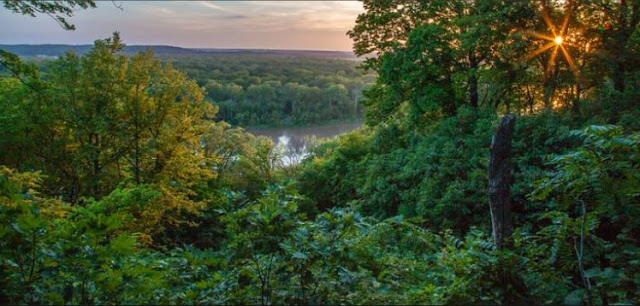Was it arrogant of them to name things like rivers and creeks and mountain meadows? Isn't it really silly to call the operation "the Corps of Discovery," as if, like Columbus, they were "discovering" anything? What right did they have to lay a claim on land that wasn't theirs? From the very top of the image above, top and center, you'll see reference to the Corps the map-maker got right, even if he got the spelling wrong. They named the river "Independence Creek." Who cares anyway--that it was christened such by "Louis" and Clark? Think anybody who lives along Independence Creek today is angry about it?--wishes it were Delmar Smith's Creek or whatever? Doubtful.
But naming things is what they did. Very few white men had ever been up the Missouri from St. Louis, and most of those who had been were French Canadians insignificant numbers, trappers and mountain men who tended to get along quite well with the Indiginous, even took a wife or two or three and learned the language.
Lewis and Clark were different. When they reached that big bend in the river up there, they couldn't help but notice a tributary, 40 yards wide or so, Clark said, and then they--arrogantly--named it as if previous to their arrival at that point in time or space no one ever seen it.
You can call that arrogance, but a better name is "privilege," specifically "white privilege." And if you think I'm getting petty about all of that, my guess is that, like me, you're white too. In the history of the region, we were the only tribe that immediately determined we "owned" the place, owned it so fully that we determined names, like the Floyd, frozen now, but still there a couple of hundred yards outside my window.
Still, I love their gushing. I really do. Right about here, in the neighborhood of Atchison, Kansas, Clark couldn't say enough about the place: " we camped in the plans one of the most beautiful places I ever Saw in my life, open and beautifully Diversified with hills & vallies all presenting themselves to the River." I can't help thinking that people of the region where I live tend to look past the rich beauty of our particular world--"it's a good place for soybeans, eh?" When people gush like the Corps did in their journals, I beam.
The Plains of this countrey are covered with a Leek Green Grass, well calculated for the sweetest and most norushing hay—interspersed with Cops [copses] of trees, Spreding their lofty branchs over Pools Springs or Brooks of fine water. Groops of Shrubs covered with the most delicious froot is to be seen in every direction, and nature appears to have exerted herself to butify the Senery by the variety of flours delicately and highly flavered, raised above the Grass, which Strikes & profumes the Sensation, and amuses the mind.So much beauty, Clark says, has a strange effect, it "throws it into Conjecterng the cause of So magnificent a Senerey [several words illegible, crossed out] in a Country thus Situated."
And then, watch for it, racism, white privilege. It is unimaginable for William Clark to observe such breathtaking beauty and not wonder at the injustice of it all such beauty in a land so "far removed from the Sivilised world to be enjoyed by nothing but the Buffalo Elk Deer & Bear in which it abounds & Savage Indians."
I adore their adoration for the beauty of God's creation here along the Missouri River, but I can't be blind to the arrogance that underlies it. Brilliant, daring men as adept with a rifle as they were with their quills, held strangely feeble regard for men and women other than themselves: "so much beauty able to be beheld only by animals and savages--how on earth can that be?


2 comments:
A bit of History. Native Americans became citizens of the US on 2June1924. It was introduced Under the Indian Citizenship Act of 1924/Gary C. Stein and signed by Pres. Calvin Cooledge. Prior to this Native Americans seeking citizenship were held to the requirements of the "Certificate of Competency" which made it virtually impossible for them to attain citizenship. Voting rights did not come to the Native Americans until 1965 and was strengthened and empowered by subsequent legislation of 1970, 75, and 82. Ironically, all this came to the freed slave in the late 1800's.
“And with all thy getting get understanding” (Proverbs 4:7).
Prior to Honest Abe, a U.S. citizen was a resident of the maritime jurisdiction -- the 68.25 square miles called the District of Columbia. I suppose there are reasons for wanting to be a slave on a slave ship.
Many people believe that the States united ended or at least become dormant when Honest Abe had the Maryland legislature arrested for not voting the way he wanted.
As far as the tribes are concerned, even though they mostly fought for Southern independence (Thomas E. Woods) I think it is not in their (or anyone else's) long term interest to become a U.S. citizen -- other options are available.
thanks,
Jerry
Post a Comment